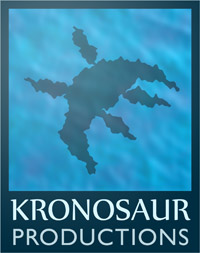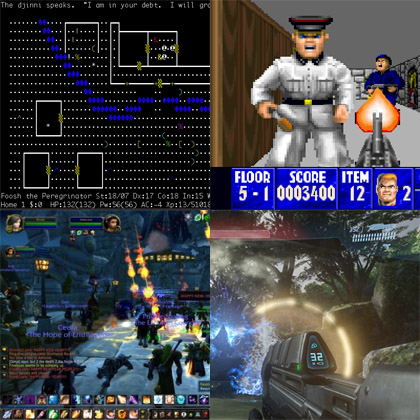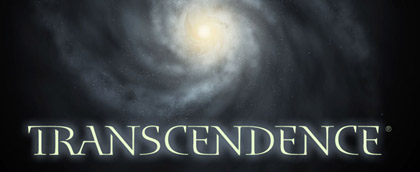|
| |
Introducing Kronosaur Productions |
|
|
6 January 2012
|

What was the golden age of computer games? Was it the 16-bit 80s of NetHack, Infocom, and Ultima? Was it the 90s decade of Wolfenstein, WarCraft, and SimCity? Or was it the 2000s, dominated by Halo, Grand Theft Auto, Wii and World of Warcraft? I find it hard to choose; every decade seems to bring more astonishing games. So my bet is this decade will end up being the golden age, with MMOs, mobile games, casual games, and reinvigorated indie games all surfing off each other and competing for our attention. The innovations in technology, game design, and business models are dizzying, and I suspect the 2010s will see some games that would have been unimaginable to my character-mode-game-playing 80s self. If so, then this is probably the worst time for me to start a game company. In a golden age everyone with talent (and many more without) will be competing to produce the most spectacular experiences. The brutal power-law curve of popularity will ensure that a tiny minority of games will gain most of the attention while the rest will remain not just niche but within the margin of error of non-existent. Nevertheless, for me writing games is like breathing is to an asthmatic, which is to say that I can't live without it, even if it doesn't always come easy. And so, despite the odds, and in defiance of almost all reason, I'm very happy to announce the founding of Kronosaur Productions, my third game company. Kronosaur Productions will work on new games and continue development on Transcendence and Anacreon.
Games & ToysWhen I told friends and relatives that I was starting a new game company they invariably asked what kind of games I was writing. I didn't have an answer beyond the unhelpful, "the kind of games I like writing." But the question gnawed at me and forced me to think more about what exactly I want to create. Do I want to create narrative-heavy games? Do I want to focus on innovative gameplay? Do I want to create deep and believable game universes? All sounded good, but I knew that saying "all of the above" risked ending up with none of the above. But when I really thought about it I realized I don't want to create games at all: I want to create toys, or more precisely, I want to create games that are also toys. A game like Monopoly has rules and objectives created by a game designer. The challenge for the player is to accomplish the objectives within the rules set by the designer. In contrast, a toy like Legos has no rules beyond its physical properties and no objectives at all. A child playing with Legos must invent their own objectives. In effect, the child has become a game designer with almost no constraints. This distinction between game and toy is not binary. A game like Dungeons & Dragons is both game and toy. It has a (very extensive) set of rules, but it is not a finished game in the same way that Monopoly is. D&D needs a Dungeon Master to create game content (the dungeon) and it needs players to invent characters that participate in the adventure. There is enough content and constraints to build on, but also the freedom to take the game in any direction you want. It is the perfect intersection of order and chaos. In a similar sense Transcendence is both a game and a toy. It is a stand-alone game, enjoyable as a pure player. But is is also a toy that you can tear apart and put back together in a different configuration. One of the most gratifying things for me, even more than hearing from people who enjoy the game, is seeing the amazing and creative things that people have built out of the Transcendence pieces. It is this collaboration of creation—in which people are both players and designers—that I most enjoy about Transcendence, and it is the one principle that I will try to bring to all Kronosaur Production games. Speaking of Transcendence, I'm sure many current players are wondering how this new company will affect the game and the community. Next week on this blog I will describe some of the new ideas that I have for the future of the game. But for now I want to emphasize three things that will not change: first, the core game will continue to be free: I strongly believe that a free game will maximize the size of our community. Second, as I described above, the ability to modify and extend the game is integral to Transcendence and that is only going to get better in the future. Finally, and most importantly, I am determined to continue to grow and nurture the community. Transcendence would not be what it is without the contributions of players and modders over the years, and it's fair to say that without the encouragement and support of the community I would not be able to start this company. Thanks to all and tune in next week! |

